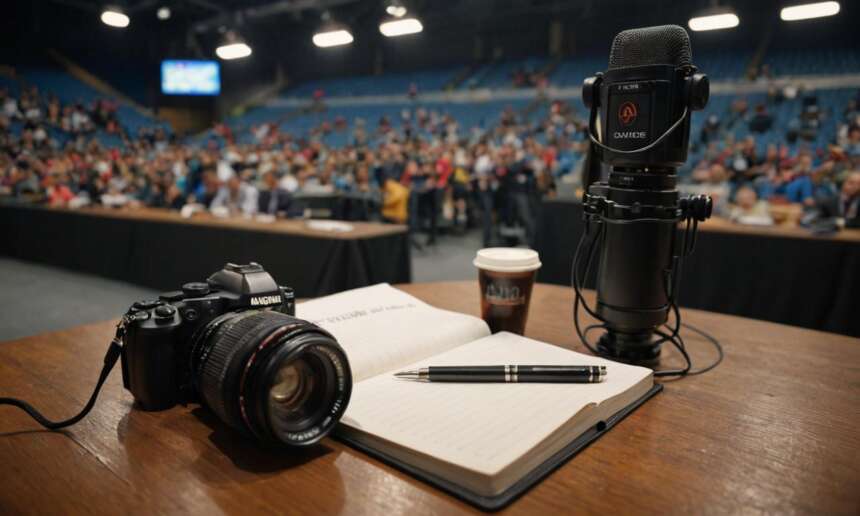Sports journalism is a dynamic field that encompasses the coverage, analysis, and reporting of sporting events, athletes, and related topics. Sports journalists play a crucial role in providing audiences with up-to-date information, insightful commentary, and engaging narratives about various sports.
Role of a Sports Journalist
A sports journalist’s primary responsibility is to deliver accurate and compelling stories about sporting events, athletes, teams, and related news. They gather information through interviews, research, and firsthand observation to provide comprehensive coverage of sporting events.
Furthermore, sports journalists analyze game strategies, player performances, and trends within the sports industry to offer valuable insights to their audience. They often attend press conferences, interact with athletes and coaches, and collaborate with other media professionals to create informative content.
Skills Required
Successful sports journalists possess a diverse set of skills that enable them to excel in their field. These skills include:
- Excellent writing abilities to craft engaging and informative articles, reports, and features.
- Strong communication skills to conduct interviews, interact with sources, and present information effectively.
- Deep knowledge of various sports, including rules, history, and current trends.
- Research skills to gather accurate data and information for their stories.
- Adaptability to work in fast-paced environments and meet tight deadlines.
- Ethical conduct and integrity to maintain credibility and trust with their audience.
Types of Sports Journalism
Sports journalism encompasses a wide range of formats and mediums, including:
- News reporting: Covering recent developments, game outcomes, and breaking news in the sports world.
- Feature writing: Exploring in-depth stories about athletes, teams, and sporting events.
- Analysis and commentary: Providing insights, opinions, and critiques on games, players, and industry trends.
- Broadcast journalism: Presenting sports news and analysis through radio, television, and online video platforms.
- Photojournalism: Capturing compelling images that tell stories and evoke emotions related to sports.
Challenges and Rewards
While sports journalism can be a rewarding career, it also presents various challenges. Sports journalists often work irregular hours, including evenings, weekends, and holidays, to cover events as they happen. Additionally, they may face pressure to meet deadlines and compete with other media outlets for exclusive stories.
However, the thrill of witnessing historic sporting moments, building relationships with athletes and coaches, and sharing stories that resonate with audiences make sports journalism a fulfilling profession for many.
Sports journalism plays a vital role in informing, entertaining, and inspiring audiences around the world. Whether through written articles, broadcast segments, or multimedia content, sports journalists contribute to the rich tapestry of sports culture by telling stories that capture the essence of competition, perseverance, and triumph.
Frequently Asked Questions
Here are some common questions related to sports journalism:
| Question | Answer |
|---|---|
| What educational background is required to become a sports journalist? | While a degree in journalism or communications is often beneficial, it’s not always necessary. Many successful sports journalists have backgrounds in fields such as English, literature, or even sports management. What’s crucial is developing strong writing, research, and communication skills. |
| How can one break into sports journalism? | Breaking into sports journalism typically requires gaining experience through internships, freelancing, or contributing to local publications or websites. Building a portfolio of work, networking within the industry, and demonstrating a deep knowledge and passion for sports can help aspiring journalists establish themselves in the field. |
| What are the future prospects for sports journalists? | The landscape of sports journalism is evolving with advancements in digital media and technology. While traditional outlets such as newspapers and television remain relevant, online platforms, social media, and streaming services are shaping the way sports content is consumed. Adaptability and a willingness to embrace new mediums and formats are essential for future success in sports journalism. |
| How do sports journalists maintain objectivity and avoid bias? | Objectivity is a cornerstone of ethical journalism, including sports journalism. While it’s natural for journalists to have personal preferences or favorite teams, maintaining impartiality in reporting is crucial. This involves presenting facts accurately, providing balanced coverage, and avoiding conflicts of interest that could compromise journalistic integrity. |
Interviewing Techniques
Interviewing is a key skill for sports journalists to gather information and insights from athletes, coaches, and other stakeholders. Effective interviewing techniques include:
- Preparation: Research the interviewee’s background, recent performances, and relevant topics to ask informed questions.
- Active listening: Pay attention to the interviewee’s responses, asking follow-up questions to delve deeper into interesting points.
- Building rapport: Establish a comfortable and respectful atmosphere to encourage openness and honesty during the interview.
- Respect boundaries: Be mindful of sensitive topics and avoid asking overly intrusive or personal questions.
- Adaptability: Be flexible in your approach, adjusting your questions based on the direction of the conversation and new information that arises.




